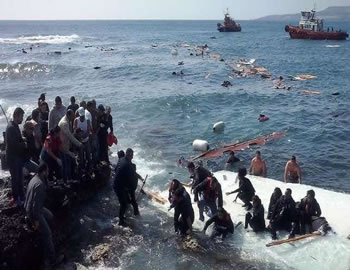The Ministry of Foreign Affairs, it would appear, has yet to purge itself of its insensitive and lethargic approach to grave issues of national concern. The ministry should have gone beyond confirming the veracity of the incident from the Nigeria mission in Rome. It should have been asking hard questions and showing more than a passing interest in the inquiry instituted by the government of Italy on the incident, especially against the backdrop of suspicion that the victims might have been tortured or sexually assaulted. Many of the dead reportedly had marks of assault and violence on their bodies. But it is gladdening that, as usual, the office of the Senior Special Assistant to the President on Foreign Affairs and Diaspora has been swift in its response to this monumental loss to Nigeria. The same can also be said of the Senate, which mandated three committees to investigate the incident, and the National Agency for the Prohibition of Traffic in persons (NAPTIP). But it is less than appropriate that the Ministry of Foreign Affairs should be in the background while institutions that should ordinarily complement its efforts take the centre stage because of its slow response to critical issues. It is about time the ministry retooled and woke up to its responsibilities.
While Nigerians lament the gruesome fate that befell 26 Nigerians on the Mediterranean, the remote causes of the proclivity of Nigerian youths to undertake foreign trips that are oftentimes perilous should be borne in mind, especially in the official circles. The present horrific story, like many more before it, underscores the tendency of Nigerians to risk their lives in order to escape from the poverty at home. That is the bitter truth. Unfortunately, the wrong impression continues to be given that there are ready jobs for illegal migrants abroad. And indeed, many youths are fixated on their fortunes being inevitably tied to travelling abroad despite palpable evidence to the contrary. For instance, while many deportees are arriving Nigeria from Libya with tales of woe, many are still travelling and a lot are still scheming to travel to that country which appears to hold nothing but misery, especially for black African nationals.
It is a fact that many Nigerians live in abject poverty. Many are truly despondent because they do not see any hope of a dramatic turnaround in the foreseeable future. This challenge is really serious. For instance, if in one fell swoop 26 girls and women died in a bid to seek improvement to their lives outside the shores of Nigeria, it can only be imagined how many Nigerians are actually undertaking such hazardous journeys. A lot of Nigerians have lost confidence in their own government and sadly, governmental efforts at restoring trust appear too little and the pace is painfully slow compared to the enormity of the entrenched socioeconomic challenges that have accumulated over time. Yes, the protracted challenges cannot be fixed overnight but the official steps being taken should be such that inspire hope in terms of their magnitude, robustness and, more importantly, sincerity. And unless and until the socioeconomic conditions improve and issues around youth unemployment and underemployment are decisively tackled, the country will continue to witness this type of terrible and distressing loss of Nigerian youths attempting to seek greener pastures. Even though it may not put paid to the exodus of Nigerian youths to foreign lands, an all-inclusive national economic prosperity will no doubt rein it in.
Meanwhile, we urge the Ministry of Foreign Affairs to weigh in strongly on the matter at issue, preferably at the diplomatic level. The ministry should officially call for a thorough probe of the events that led to the untimely death of the 26 Nigerians and painstakingly follow up on the progress of the investigation. The goal should be to ensure that the culprits are brought to book if it is proven that the death of the 26 Nigerian females was maliciously orchestrated or bordered on culpable negligence.






